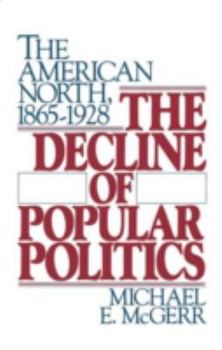The Decline of Popular Politics: The American North, 1865-1928
Select Format
Select Condition 
Book Overview
In the 1984 presidential election, only half of the eligible electorate exercised its right to vote. Why does politics no longer excite many--of not most Americans? Michael McGerr attrributes the decline in voting in the American North to the transformation of political style after the Civil War. The Decline of Popular Politics vividly recreates a vanished world of democratic ritual and charts its disappearance in the rapid change of industrial society. A century ago, political campaigns meant torchlight parades, spectacular pageants staged by opposing parties, and crowds of citizens attired in military dress or proudly displaying their crafts at well-attended rallies. The intense partisanship of presidential campaigns and party newspapers made political choice easy for people from all walks of life. In the late 1860s and 1870s, however, the rise of liberalism led to a rejection of partisanship by the press and a move towards "educational," rather than spectacular, electioneering. This style then lost out at the turn of the century to the sensational journalism of Joseph Pulitzer and William Randolph Hearst, and the "advertised" campaigning of Mark Hanna and other politicians. McGerr shows how these new developments made it increasingly difficult for many Northerners to link their political impulses with political action. By the 1920s, Northern politics resembled our own public life today. A vital democratic culture had yielded to advertised campaigns, an emphasis on personalities rather than issues or partisanship, and low voter turnout. About the Author: Michael E. McGerr is Assistant Professor of History at the Massachusetts Institute of Technology.
Format:Hardcover
Language:English
ISBN:0195036824
ISBN13:9780195036824
Release Date:February 1986
Publisher:Oxford University Press, USA
Length:316 Pages
Weight:1.10 lbs.
Dimensions:0.9" x 5.7" x 8.6"
Customer Reviews
1 rating
Accounting for the increasing boredom
Published by Thriftbooks.com User , 19 years ago
Imagine being bored with what is going to happen to you. What does it take to bore people to death with the very means by which they can change their circumstances for the better? McGerr details the gradual development of what essential amounts to the boredom of an increasing number of Americans with the political system. He contrasts what turn out to be significant shifts in emphasis in the way we do politics especially from after the civil war that shows voter apathy is not something new. He does this in a way that avoids being boring itself. He does all the footwork and research and develops the narrative nicely.





